Researcher dedicated to Tibetan antelope protection in NW China's Qinghai

Lian Xinming (L) and his student Wang Zihan use a drone to monitor an overnight habitat of Tibetan antelopes during their migration near the Qumar River Bridge along the Qinghai-Tibet Highway in Hoh Xil, a natural reserve in northwest China's Qinghai Province, on the early hours of June 16, 2023.
Lian Xinming, a researcher at the Northwest Institute of Plateau Biology under the Chinese Academy of Sciences, has dedicated more than 20 years of research to Tibetan antelopes since he first set foot on Hoh Xil in 2002.
"Tibetan antelope protection stands as a successful example of human involvement in rescuing endangered animals," said Lian. "Using advanced technology to gain insights into what lies behind the migration of a species can also inspire the research and conservation efforts for other species."
According to the Sanjiangyuan National Park Administration, the population of Tibetan antelopes in the Hoh Xil national natural reserve has recovered from less than 20,000 during the initial stages of protection to more than 70,000. (Xinhua/Zhang Cheng)

Lian Xinming and his team members monitor an overnight habitat of Tibetan antelopes during their migration near the Qumar River Bridge along the Qinghai-Tibet Highway in Hoh Xil, a natural reserve in northwest China's Qinghai Province, on the early hours of June 16, 2023.
Lian Xinming, a researcher at the Northwest Institute of Plateau Biology under the Chinese Academy of Sciences, has dedicated more than 20 years of research to Tibetan antelopes since he first set foot on Hoh Xil in 2002.
"Tibetan antelope protection stands as a successful example of human involvement in rescuing endangered animals," said Lian. "Using advanced technology to gain insights into what lies behind the migration of a species can also inspire the research and conservation efforts for other species."
According to the Sanjiangyuan National Park Administration, the population of Tibetan antelopes in the Hoh Xil national natural reserve has recovered from less than 20,000 during the initial stages of protection to more than 70,000. (Xinhua/Zhang Cheng)

Lian Xinming (L) and his student Wang Dong store the feces of Tibetan antelopes in a nitrogen tank in Hoh Xil, a natural reserve in northwest China's Qinghai Province, June 15, 2023.
Lian Xinming, a researcher at the Northwest Institute of Plateau Biology under the Chinese Academy of Sciences, has dedicated more than 20 years of research to Tibetan antelopes since he first set foot on Hoh Xil in 2002.
"Tibetan antelope protection stands as a successful example of human involvement in rescuing endangered animals," said Lian. "Using advanced technology to gain insights into what lies behind the migration of a species can also inspire the research and conservation efforts for other species."
According to the Sanjiangyuan National Park Administration, the population of Tibetan antelopes in the Hoh Xil national natural reserve has recovered from less than 20,000 during the initial stages of protection to more than 70,000. (Xinhua/Jin Liwang)
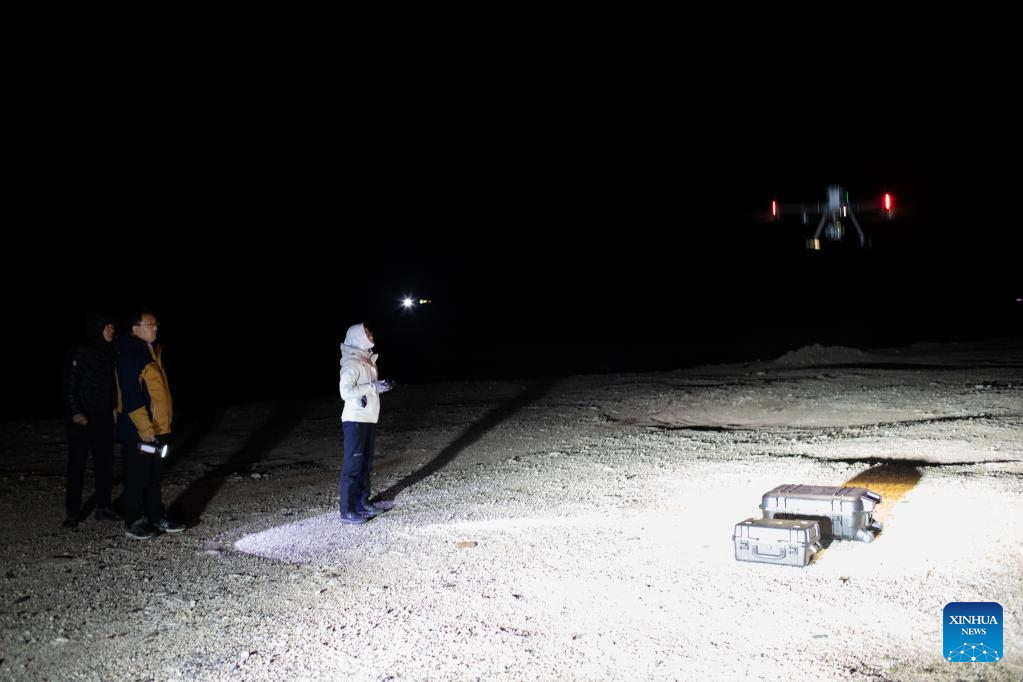
Lian Xinming and his team members use a drone to monitor an overnight habitat of Tibetan antelopes during their migration near the Qumar River Bridge along the Qinghai-Tibet Highway in Hoh Xil, a natural reserve in northwest China's Qinghai Province, on the early hours of June 16, 2023.
Lian Xinming, a researcher at the Northwest Institute of Plateau Biology under the Chinese Academy of Sciences, has dedicated more than 20 years of research to Tibetan antelopes since he first set foot on Hoh Xil in 2002.
"Tibetan antelope protection stands as a successful example of human involvement in rescuing endangered animals," said Lian. "Using advanced technology to gain insights into what lies behind the migration of a species can also inspire the research and conservation efforts for other species."
According to the Sanjiangyuan National Park Administration, the population of Tibetan antelopes in the Hoh Xil national natural reserve has recovered from less than 20,000 during the initial stages of protection to more than 70,000. (Xinhua/Jin Liwang)

Lian Xinming and his team members drive to an overnight habitat of Tibetan antelopes during their migration near the Qumar River Bridge along the Qinghai-Tibet Highway in Hoh Xil, a natural reserve in northwest China's Qinghai Province, on the early hours of June 16, 2023.
Lian Xinming, a researcher at the Northwest Institute of Plateau Biology under the Chinese Academy of Sciences, has dedicated more than 20 years of research to Tibetan antelopes since he first set foot on Hoh Xil in 2002.
"Tibetan antelope protection stands as a successful example of human involvement in rescuing endangered animals," said Lian. "Using advanced technology to gain insights into what lies behind the migration of a species can also inspire the research and conservation efforts for other species."
According to the Sanjiangyuan National Park Administration, the population of Tibetan antelopes in the Hoh Xil national natural reserve has recovered from less than 20,000 during the initial stages of protection to more than 70,000. (Xinhua/Jin Liwang)
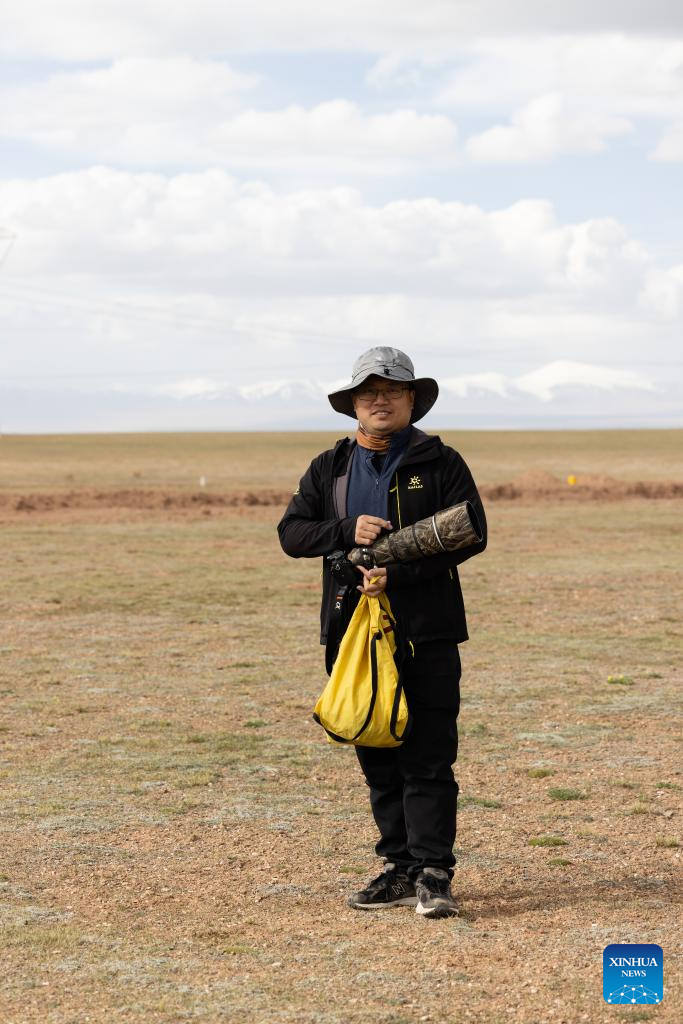
Lian Xinming poses for a photo in Hoh Xil, a natural reserve in northwest China's Qinghai Province, June 15, 2023.
Lian Xinming, a researcher at the Northwest Institute of Plateau Biology under the Chinese Academy of Sciences, has dedicated more than 20 years of research to Tibetan antelopes since he first set foot on Hoh Xil in 2002.
"Tibetan antelope protection stands as a successful example of human involvement in rescuing endangered animals," said Lian. "Using advanced technology to gain insights into what lies behind the migration of a species can also inspire the research and conservation efforts for other species."
According to the Sanjiangyuan National Park Administration, the population of Tibetan antelopes in the Hoh Xil national natural reserve has recovered from less than 20,000 during the initial stages of protection to more than 70,000. (Xinhua/Jin Liwang)
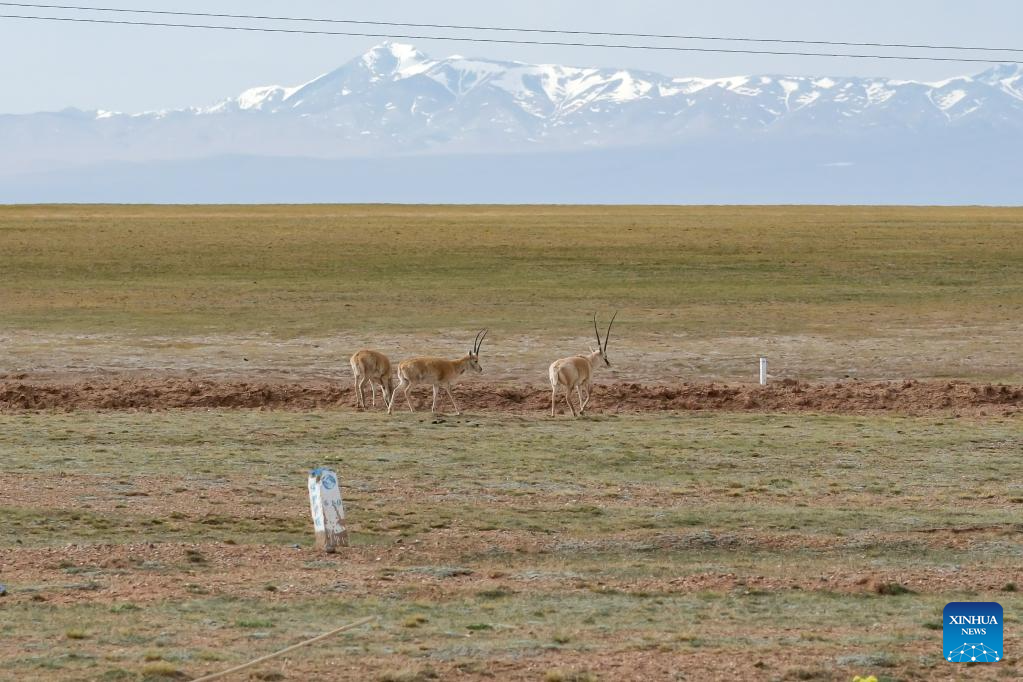
Tibetan antelopes are pictured in Hoh Xil, a natural reserve in northwest China's Qinghai Province, June 15, 2023.
Lian Xinming, a researcher at the Northwest Institute of Plateau Biology under the Chinese Academy of Sciences, has dedicated more than 20 years of research to Tibetan antelopes since he first set foot on Hoh Xil in 2002.
"Tibetan antelope protection stands as a successful example of human involvement in rescuing endangered animals," said Lian. "Using advanced technology to gain insights into what lies behind the migration of a species can also inspire the research and conservation efforts for other species."
According to the Sanjiangyuan National Park Administration, the population of Tibetan antelopes in the Hoh Xil national natural reserve has recovered from less than 20,000 during the initial stages of protection to more than 70,000. (Xinhua/Zhang Cheng)
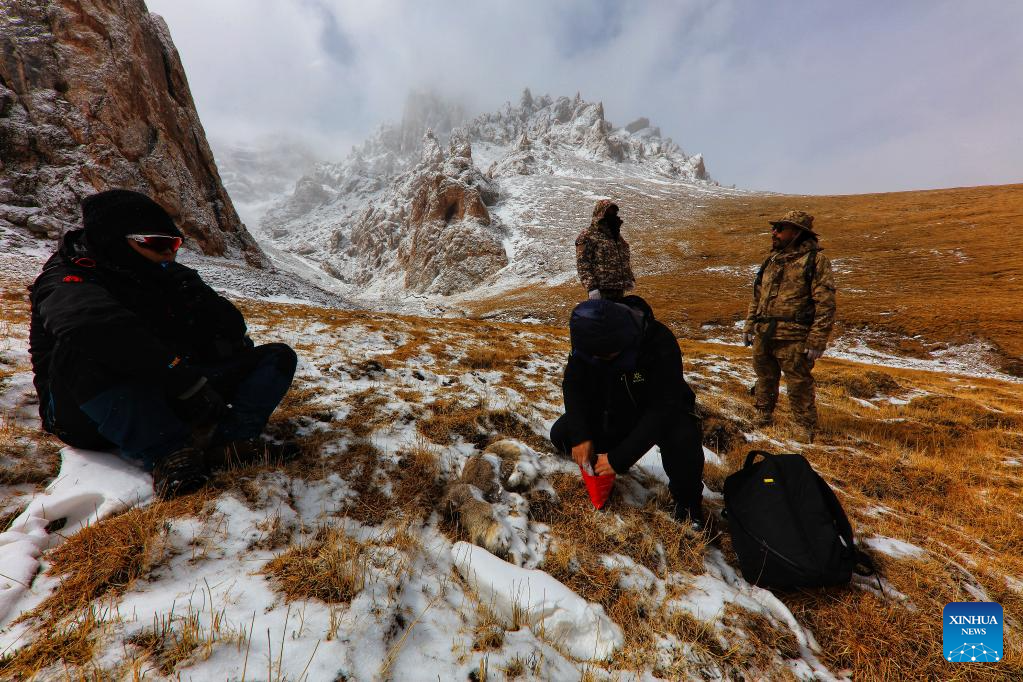
This file photo taken in March 2019 shows Lian Xinming (R, front) collecting samples in the Sanjiangyuan area in northwest China's Qinghai Province.
Lian Xinming, a researcher at the Northwest Institute of Plateau Biology under the Chinese Academy of Sciences, has dedicated more than 20 years of research to Tibetan antelopes since he first set foot on Hoh Xil in 2002.
"Tibetan antelope protection stands as a successful example of human involvement in rescuing endangered animals," said Lian. "Using advanced technology to gain insights into what lies behind the migration of a species can also inspire the research and conservation efforts for other species."
According to the Sanjiangyuan National Park Administration, the population of Tibetan antelopes in the Hoh Xil national natural reserve has recovered from less than 20,000 during the initial stages of protection to more than 70,000. (Xinhua)

Lian Xinming collects the feces of Tibetan antelopes for research in Hoh Xil, a natural reserve in northwest China's Qinghai Province, June 15, 2023.
Lian Xinming, a researcher at the Northwest Institute of Plateau Biology under the Chinese Academy of Sciences, has dedicated more than 20 years of research to Tibetan antelopes since he first set foot on Hoh Xil in 2002.
"Tibetan antelope protection stands as a successful example of human involvement in rescuing endangered animals," said Lian. "Using advanced technology to gain insights into what lies behind the migration of a species can also inspire the research and conservation efforts for other species."
According to the Sanjiangyuan National Park Administration, the population of Tibetan antelopes in the Hoh Xil national natural reserve has recovered from less than 20,000 during the initial stages of protection to more than 70,000. (Xinhua/Jin Liwang)

Lian Xinming looks up at the drone he uses to monitor an overnight habitat of Tibetan antelopes during their migration near the Qumar River Bridge along the Qinghai-Tibet Highway in Hoh Xil, a natural reserve in northwest China's Qinghai Province, on the early hours of June 16, 2023.
Lian Xinming, a researcher at the Northwest Institute of Plateau Biology under the Chinese Academy of Sciences, has dedicated more than 20 years of research to Tibetan antelopes since he first set foot on Hoh Xil in 2002.
"Tibetan antelope protection stands as a successful example of human involvement in rescuing endangered animals," said Lian. "Using advanced technology to gain insights into what lies behind the migration of a species can also inspire the research and conservation efforts for other species."
According to the Sanjiangyuan National Park Administration, the population of Tibetan antelopes in the Hoh Xil national natural reserve has recovered from less than 20,000 during the initial stages of protection to more than 70,000. (Xinhua/Zhang Cheng)

Lian Xinming (L) and his student Wang Zihan use a drone to monitor an overnight habitat of Tibetan antelopes during their migration near the Qumar River Bridge along the Qinghai-Tibet Highway in Hoh Xil, a natural reserve in northwest China's Qinghai Province, on the early hours of June 16, 2023.
Lian Xinming, a researcher at the Northwest Institute of Plateau Biology under the Chinese Academy of Sciences, has dedicated more than 20 years of research to Tibetan antelopes since he first set foot on Hoh Xil in 2002.
"Tibetan antelope protection stands as a successful example of human involvement in rescuing endangered animals," said Lian. "Using advanced technology to gain insights into what lies behind the migration of a species can also inspire the research and conservation efforts for other species."
According to the Sanjiangyuan National Park Administration, the population of Tibetan antelopes in the Hoh Xil national natural reserve has recovered from less than 20,000 during the initial stages of protection to more than 70,000. (Xinhua/Jin Liwang)

Lian Xinming shows the feces of Tibetan antelopes he collected for research in Hoh Xil, a natural reserve in northwest China's Qinghai Province, June 15, 2023.
Lian Xinming, a researcher at the Northwest Institute of Plateau Biology under the Chinese Academy of Sciences, has dedicated more than 20 years of research to Tibetan antelopes since he first set foot on Hoh Xil in 2002.
"Tibetan antelope protection stands as a successful example of human involvement in rescuing endangered animals," said Lian. "Using advanced technology to gain insights into what lies behind the migration of a species can also inspire the research and conservation efforts for other species."
According to the Sanjiangyuan National Park Administration, the population of Tibetan antelopes in the Hoh Xil national natural reserve has recovered from less than 20,000 during the initial stages of protection to more than 70,000. (Xinhua/Jin Liwang)

Lian Xinming (R) and his student Wang Dong collect the feces of Tibetan antelopes for research in Hoh Xil, a natural reserve in northwest China's Qinghai Province, June 15, 2023.
Lian Xinming, a researcher at the Northwest Institute of Plateau Biology under the Chinese Academy of Sciences, has dedicated more than 20 years of research to Tibetan antelopes since he first set foot on Hoh Xil in 2002.
"Tibetan antelope protection stands as a successful example of human involvement in rescuing endangered animals," said Lian. "Using advanced technology to gain insights into what lies behind the migration of a species can also inspire the research and conservation efforts for other species."
According to the Sanjiangyuan National Park Administration, the population of Tibetan antelopes in the Hoh Xil national natural reserve has recovered from less than 20,000 during the initial stages of protection to more than 70,000. (Xinhua/Jin Liwang)

Lian Xinming (R) and his student Wang Dong use binocles to observe the migration of Tibetan antelopes in Hoh Xil, a natural reserve in northwest China's Qinghai Province, June 15, 2023.
Lian Xinming, a researcher at the Northwest Institute of Plateau Biology under the Chinese Academy of Sciences, has dedicated more than 20 years of research to Tibetan antelopes since he first set foot on Hoh Xil in 2002.
"Tibetan antelope protection stands as a successful example of human involvement in rescuing endangered animals," said Lian. "Using advanced technology to gain insights into what lies behind the migration of a species can also inspire the research and conservation efforts for other species."
According to the Sanjiangyuan National Park Administration, the population of Tibetan antelopes in the Hoh Xil national natural reserve has recovered from less than 20,000 during the initial stages of protection to more than 70,000. (Xinhua/Jin Liwang)
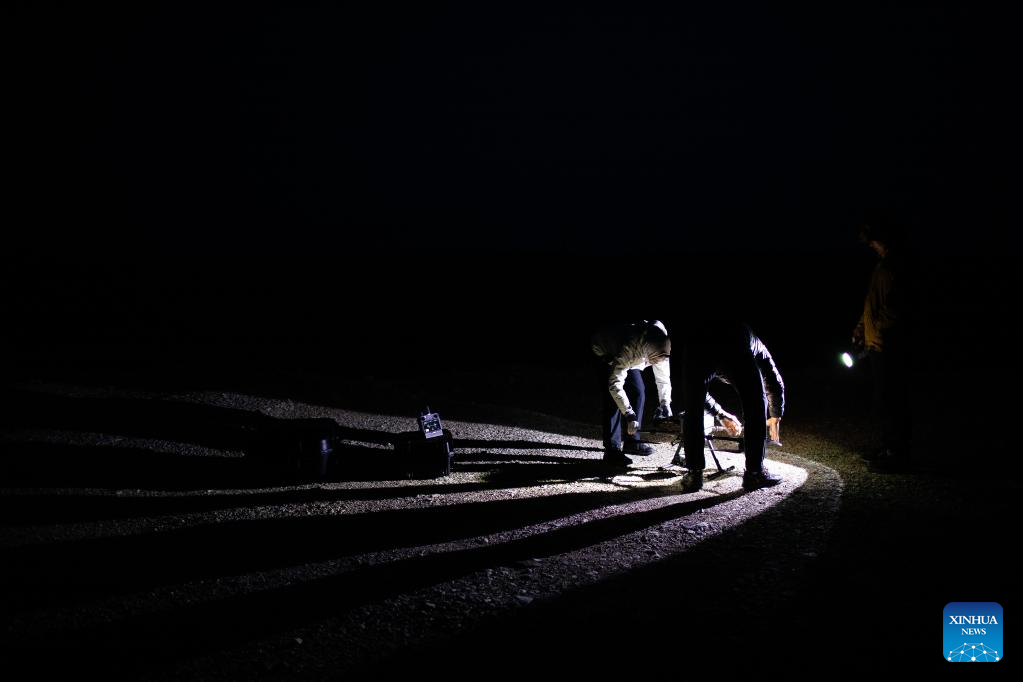
Lian Xinming and his team members prepare to use a drone to monitor an overnight habitat of Tibetan antelopes during their migration near the Qumar River Bridge along the Qinghai-Tibet Highway in Hoh Xil, a natural reserve in northwest China's Qinghai Province, on the early hours of June 16, 2023.
Lian Xinming, a researcher at the Northwest Institute of Plateau Biology under the Chinese Academy of Sciences, has dedicated more than 20 years of research to Tibetan antelopes since he first set foot on Hoh Xil in 2002.
"Tibetan antelope protection stands as a successful example of human involvement in rescuing endangered animals," said Lian. "Using advanced technology to gain insights into what lies behind the migration of a species can also inspire the research and conservation efforts for other species."
According to the Sanjiangyuan National Park Administration, the population of Tibetan antelopes in the Hoh Xil national natural reserve has recovered from less than 20,000 during the initial stages of protection to more than 70,000. (Xinhua/Jin Liwang)
Photos
Related Stories
- Magnificent scenery of colors of Erling Lake and sky merging on horizon
- 3rd China (Qinghai) Int'l Ecological Expo kicks off
- E-commerce promotes rural revitalization in NW China's Qinghai
- Scenery of Qairhan salt lake in Golmud, NW China's Qinghai
- Scenery of Qinghai Lake in NW China
- Migratory birds gather in Qilian Mountain National Park in NW China's Qinghai
- Red deer spotted in Qinghai
- China's Qinghai sees growth in green coverage in 2022
- Top legislature mulls law on Qinghai-Tibet Plateau ecological conservation
- View of Danxia landform in Qinghai, NW China
Copyright © 2023 People's Daily Online. All Rights Reserved.









